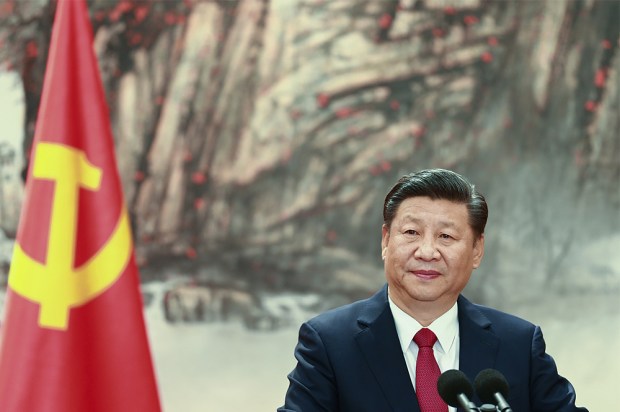It cannot be other than good news that a rescuer has been found for the bankrupt remains of British Steel, and in particular for its ‘long products’ plant at Scunthorpe — even if the buyer, at a token £50 million but with a promise of £1.2 billion of investment, is a little-known Chinese group, Jingye, owned by a former communist party official, Li Ganpo. Jingye has stepped in after potential offers from the Anglo–Indian tycoon Sanjeev Gupta and a Turkish steelmaker, Ataer, failed to firm up. Some 4,000 British Steel jobs, and many more in its supply chains, will be saved if this deal goes through. But still we might wonder at Jingye’s motivation.
Chinese dumping of cheap steel has already wreaked havoc in the rest of the world; it seems unlikely there’s anything Scunthorpe can make that Shanghai can’t make cheaper, or that Mr Li is excited about orders from UK infrastructure projects that might never happen, such as HS2, let alone British Steel’s potential to win business from our soon-to-be-former EU partners. No, this looks very much like a flag-planting exercise designed to remind us of China’s industrial might. The strategy is nothing subtle: it’s about being big and being everywhere.
What to tell Tory candidates
We’re not in recession, having achieved a 0.3 per cent expansion in the third quarter following a negative second quarter; July was a good month but the ONS says the UK economy narrowly contracted again in August and September. Growth overall is at 1 per cent, which is pretty dismal even if no worse than continental Europe, and no one claims to have sighted a recovery of business investment. Be thankful, then, that the threat of Jeremy Corbyn has receded after Nigel Farage’s decision not to contest Tory seats. But if there are blue rosettes on your doorstep, here’s what to tell them: get Brexit done before it does any more damage, park Boris’s expensive vote-buying promises — and start doing everything you can to make conditions fertile for business again, in the high street, the industrial park, the incubator and the research lab.
Mint condition
Weekending in Cardiff — of which more, including a top restaurant tip, another day — I took the opportunity to visit the Royal Mint at nearby Llantrisant. Owned by HM Treasury, the Mint has the feel of a small business based on ancient craft skills but is also a successful exporter, having produced coins for 31 nations last year. It’s also a model of how to present repetitive metal-bashing to visitors in an interesting way, so here are some facts I picked up.
Llantrisant was chosen in 1967 for the Mint’s relocation from its historic site beside the Tower of London because Jim Callaghan, who was Labour’s Chancellor and a Cardiff MP, shamelessly decided to bag its 1,000 jobs for his own patch. The Mint today is diversifying, into commemorative products and even gold-backed securities, in response to global decline in cash use: but the trend is slowing because young people who shop only with contactless plastic find they rapidly lose budgetary control and sink into debt, so are reverting to the safety of notes and coin. Lastly, in this 50th anniversary year of the 50 pence piece, the rarest collectors’ coin is the one minted to mark Brexit on 31 October; there were three million of them, but allegedly they’ve all been melted down.
Tunnel vision
Our Economic Disruptor of the Year Awards for 2019 reach their finale this week with a gala dinner at London’s Postal Museum sponsored by the private bank Julius Baer: the winners will be named in these pages next week. Like last year (only more so, because we had 50 per cent more entries, better spread across the country), the judging process has been a journey around the UK’s evolving entrepreneurial landscape. We heard less this year about ‘fintech’ — consumers already face a surfeit of choice in banking and payment apps — but a lot more about combinations of ‘big data’ and neuroscience, and about innovative answers to environmental threats. We also heard more about social purpose — but almost nothing about what the rest of society often wrongly assumes to be the real purpose of entrepreneurship, which is cashing out to retire rich; nor did any entrant I met say ‘If we get a bad Brexit or a Corbyn government, I’ll throw in the towel’.
Call it tunnel vision if you like, but most business innovators are like scientists with microscopes, obsessively seeking perfect matches of product and market while ignoring whatever chaos politicians create around them. And thank goodness for that: our economic disruptors are all, in different ways, trying to make a better world.
Modern menace
Mind you, closing out what’s around you isn’t always a good thing. I’ll be happy to back the tech entrepreneur who designs an app that allows officials — or sensible grown-ups — to interrupt whatever anyone in their vicinity is listening to in public places through earphones or big show-off headphones. This thought occurred to me at Holborn station at 11 a.m. on Monday, when Tube workers (and I) were trying in to observe the two minutes’ Armistice Day silence that had just been announced over the tannoy. But few passengers seemed to have taken in the announcement and one young woman, deep in anxious conversation on her phone about where she was meant to be, approached the uniformed staff who were standing at attention to ask loudly for directions. They tried to hold their dignity but she persisted, ruining the moment. I happened to follow her down Kingsway as she kept repeating ‘What the fuck do I do now?’ into her phone. How she would have jumped if I’d been able to growl into mine: ‘Take those earphones out, you modern menace, and go back to the station and apologise.’
Got something to add? Join the discussion and comment below.
Get 10 issues for just $10
Subscribe to The Spectator Australia today for the next 10 magazine issues, plus full online access, for just $10.
You might disagree with half of it, but you’ll enjoy reading all of it. Try your first month for free, then just $2 a week for the remainder of your first year.















Comments
Don't miss out
Join the conversation with other Spectator Australia readers. Subscribe to leave a comment.
SUBSCRIBEAlready a subscriber? Log in